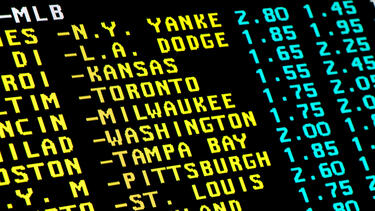What Sports Betting Teaches Us about Financial Markets
In a new paper, Tobias Moskowitz of Yale SOM finds that the sports betting market exhibits pricing patterns also seen in the stock market—suggesting that both may be subject to human irrationality.

Two stock market strategies stand out for their consistent effectiveness: value trading and momentum trading. Value traders look for stocks that seem in some way underpriced—for example, companies that have high earnings but low share prices—and wait for other investors to get wise. Momentum traders seek to identify stocks on the rise and sell them when they reach their peak—essentially, to buy high and sell higher.
Why do these strategies work? Two camps of economists arrive at different answers. For proponents of market efficiency—those who think prices correctly reflect all available information in the market—investors can only gain above-market returns by taking on additional risk; value and momentum effects emerge from that process.
Behavioral economists, by contrast, argue that value and momentum traders are shrewdly identifying irrationality in the market. In their view, these investors have correctly picked out stocks that are simply mispriced due to human foibles. Momentum traders are leveraging the false but widespread belief that winners will keep on winning; value traders appreciate some aspect of a company that others are overlooking.
So, who is right? The stock market itself makes it hard to prove one story or another, since there’s no way to objectively determine whether a company’s stock price is “correct” or not at any given moment.
This problem got Tobias Moskowitz thinking. Moskowitz, the Dean Takahashi ’80 B.A., ’83 M.P.P.M. Professor of Finance at Yale SOM, has a longstanding interest in the intersection of sports and economics. (He even co-authored a book on the topic, Scorecasting: The Hidden Influences Behind How Sports are Played and Games are Won.) He realized that sports betting markets might offer a useful analogy to financial markets, and provide a way to test the competing theories about asset pricing.
Sports betting markets and financial markets share many features: lots of activity, lots of information, the presence of professional analysts, and so on. Betting lines—the odds set by bookmakers, which are constantly shifting in the days leading up to a game, and which determine how much bettors must pay to place a bet—offer a good analogy to stock prices.
But the markets differ in two key ways. First, sports betting behavior for any given game or on any given weekend is not affected by macroeconomic factors. (Of course, the sports betting market as a whole responds to the overall economy—fewer people will be willing to gamble during a recession—but at a more granular level, “what’s going on with the Fed or oil prices has nothing to do with whether the Packers-49ers game is priced differently than the Buccaneers-Rams game,” Moskowitz says.) Second, in sports betting markets, there is empirical evidence for whether prices are correct or not: the outcome of the game. “It’s a very clean laboratory,” he says.
With systematic risk—the risk inherent in the entire market—removed as a possible explanation for prices, Moskowitz could test whether sports betting markets exhibit value and momentum effects—and if they did, he reasoned, that would suggest behavioral phenomena were most likely at work.
So, he gathered 30 years of sports betting data for games in Major League Baseball, the National Basketball Association, the National Football League, and the National Hockey League. Then, he compared all the available betting lines for any particular game, as well as betting lines for different games happening at the same time, against the outcomes of the games and the performance of the teams in general. This allowed him to see whether bettors were over- or underpricing particular betting contracts.
Sports betting contracts exhibit strong momentum effects, says Tobias Moskowitz. In other words, “if you look at teams that have done well recently, bettors overprice those teams.”
Sports betting contracts, he discovered, exhibit strong momentum effects. In other words, Moskowitz says, “if you look at teams that have done well recently, bettors overprice those teams.”
Figuring out whether there were value effects—that is, whether bettors were undervaluing certain teams—was trickier, and involved calculating fundamental qualities of the team and comparing it to the betting price. Based on this analysis, Moskowitz found what he describes as “modest evidence of value effects.” That is, there was some evidence that bettors underpriced certain under-the-radar teams.
So, what does that mean for financial markets, and for the perennial efficient markets versus behavioral explanations debate? Moskowitz is careful not to overstate the case: “What I would say is, it’s at least suggestive,” he says. “My belief in the behavioral stories did get a little stronger after I did this study.”
And while the point of the research was mostly to examine asset pricing, not sports betting, he did come away with a few insights about sports betting. For example: just because a team has been doing well doesn’t mean it will keep doing so. “Don’t chase winners in sports betting,” Moskowitz says. Similarly, people love a long shot: “They way overpay for an underdog and way underpay for a favorite.” But the biggest lesson of all? With astronomically high transaction fees and commissions for bookmakers, “you can’t make money.” With sports betting, as with stocks, play at your own risk.